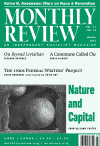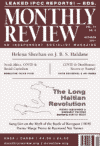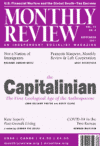
For an Ecosocialist Degrowth
Degrowth and ecosocialism are two of the most important movements—and proposals—on the radical side of the ecological spectrum. | more…

Degrowth and ecosocialism are two of the most important movements—and proposals—on the radical side of the ecological spectrum. | more…

The struggle over schools today requires battles over both the privatization of education and the current attempts to limit its social content and meaning. Those fighting against this changing totality must align themselves with the embattled radical teachers in the trenches. In the famous words of Grace Lee Boggs, more than a half-century ago, it is necessary to create “a new system of education that will have as its means and its end the development of the great masses of people to govern over themselves and administer over things.” | more…

From September to November 2021, overlapping with the 2021 UN Climate Change Conference negotiations in Glasgow, three major interrelated developments occurred in global finance. Taken together, these changes mark a turning point in the financial expropriation of the earth and the culmination of a theoretical shift in the dominant economic paradigm aimed at the unlimited accumulation of total capital, which is now seen as including “natural capital.” | more…

In Beyond Leviathan: Critique of the State, István Mészáros closes a trilogy that was first outlined in Marx’s Theory of Alienation, later greatly developed in Beyond Capital, and is now concluded in this new work. Throughout his immensely rich work, Mészáros developed, amid many original formulations, an increasingly relevant concept: capital’s order of social metabolic reproduction. | more…
Did Karl Marx have a theory of race and capitalism? Not exactly, but he theorized on these issues over four decades and much of what he wrote still speaks to us today. At a time of global and U.S. struggles for liberation in the face of a deeply racialized fascist threat, these writings are worth revisiting. | more…

A new poem by Raymond Nat Turner. | more…

A new poem by Black Agenda Report poet-in-residence, Raymond “Nat” Turner. | more…

A new poem by Marge Piercy. | more…

What was most significant about the published Part I of the report was that it revealed that even in the most optimistic projection of the Shared Socioeconomic Pathways—in which carbon emissions globally peak in the next four years, a 1.5°C increase in global average temperature over preindustrial levels would be avoided until 2040, and the goal of net zero carbon emissions would be reached by 2050—the consequences for global humanity would nonetheless be catastrophic by the measure of all historical precedents. | more…

In order to commit murder or mayhem under this program, vouchers must be submitted within one week prior to the actions contemplated or within a month afterward. Persons who commit violent acts without valid vouchers will be asked to enter into Voluntary Consent Agreements to desist from unauthorized murder or mayhem, and up to one tenth of any ill-gotten gains will be donated voluntarily to the charity of their choice, without any implication of admission of guilt. | more…

A new poem by Marge Piercy. | more…

In 2004, Washington launched a whole new strategy of financial war, based on the role of the U.S. dollar as the hegemonic foreign-exchange currency, to cut off the economic circulation of targeted states. The United States has created, as part of its “rules-based international order,” a coercive global framework extending U.S. financial jurisdiction to every country, economic entity, and person engaged at any point in U.S. dollar transactions anywhere in the world. | more…
Notifications